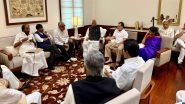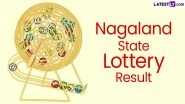Srinagar (Jammu and Kashmir) [India], August 18 (ANI): The Representation of People Act 1950 and 1951 is applicable in Jammu and Kashmir after the abrogation of Article 370, which allows the ordinarily residing person to get registered in electoral rolls of UT of Jammu and Kashmir, said government officials on Thursday.
The statement comes a day after the Election Commission announced it would give voting rights to those who were not voters in Jammu and Kashmir's Special Summary Revision.
Also Read | Indian Army Jawan On Leave Shot Dead in Patna, Probe Underway.
The move was opposed by PDP chief Mehbooba Mufti who called it the "last nail in the coffin of electoral democracy".
"After the abrogation of Article 370, Representation of People Act 1950 and 1951 is applicable. It allows ordinarily residing person to get registered in electoral rolls of UT of J-K, provided he/she gets the name deleted from the electoral roll of his/her native constituency," said the government officials.
Also Read | Electricity Bill Scam Through SMSes Continues in Tamil Nadu, Watch Modus Operandi Video.
"Even prior to the abrogation of Article 370, those ordinarily residing in UT were eligible to get registered in electoral rolls. They were categorised as Non-Permanent Resident (NPR) voters. During the last Parliamentary elections there were approx 32,000 NPR voters in J-K," they added.
Earlier today, addressing a press conference, Mufti said, "This is the last nail in the coffin of electoral democracy. A Muslim majority state chose India. They wanted to be part of secular India. But people have lost confidence in voting. Everything is happening in BJP's interest."
She also asked National Conference (NC) leader Farooq Abdullah to convene an all-party meeting to decide the future course of action with regarding the election commission allowing outsiders to register as voters in Jammu and Kashmir.
Election Commission on Wednesday announced the schedule of the Special Summary Revision in Jammu and Kashmir, and said that the people who were not voters in the Assembly after the abrogation of Article 370 from the region can now be named on the voter's list.
According to an official, the person need not be a "permanent resident" of the Union Territory for the same.
Addressing a press conference, Hirdesh Kumar, Chief Electoral Officer, J-K and Ladakh, said, "After the abrogation of Article 370, many people who weren't voters in the Assembly can now be named on the voter's list to cast their vote... and no person needs to be a permanent resident of the state/UT."
According to the schedule, Integrated Draft Electoral Roll would be published by all Electoral Registration Officers on September 15, 2022. The period between September 15 and October 25 has been earmarked for filing claims and objections and all disposals in this regard would be completed by November 10.
Checking of health parameters and obtaining the Commission's permission for final publication, updating the database and printing of supplements are to be done by November 19, 2022. The Final Electoral Roll would be published on November 25.
The Chief Electoral Officer reiterated that any person attaining the age of 18 years on or before October 1, 2022, who is otherwise qualified to be enrolled as an elector in the Electoral Roll, can apply for his registration during this special summary revision.
The final electoral roll after due disposal of all claims and objections filed within the stipulated time period would be published on November 25, 2022. (ANI)
(The above story is verified and authored by ANI staff, ANI is South Asia's leading multimedia news agency with over 100 bureaus in India, South Asia and across the globe. ANI brings the latest news on Politics and Current Affairs in India & around the World, Sports, Health, Fitness, Entertainment, & News. The views appearing in the above post do not reflect the opinions of LatestLY)













 Quickly
Quickly


